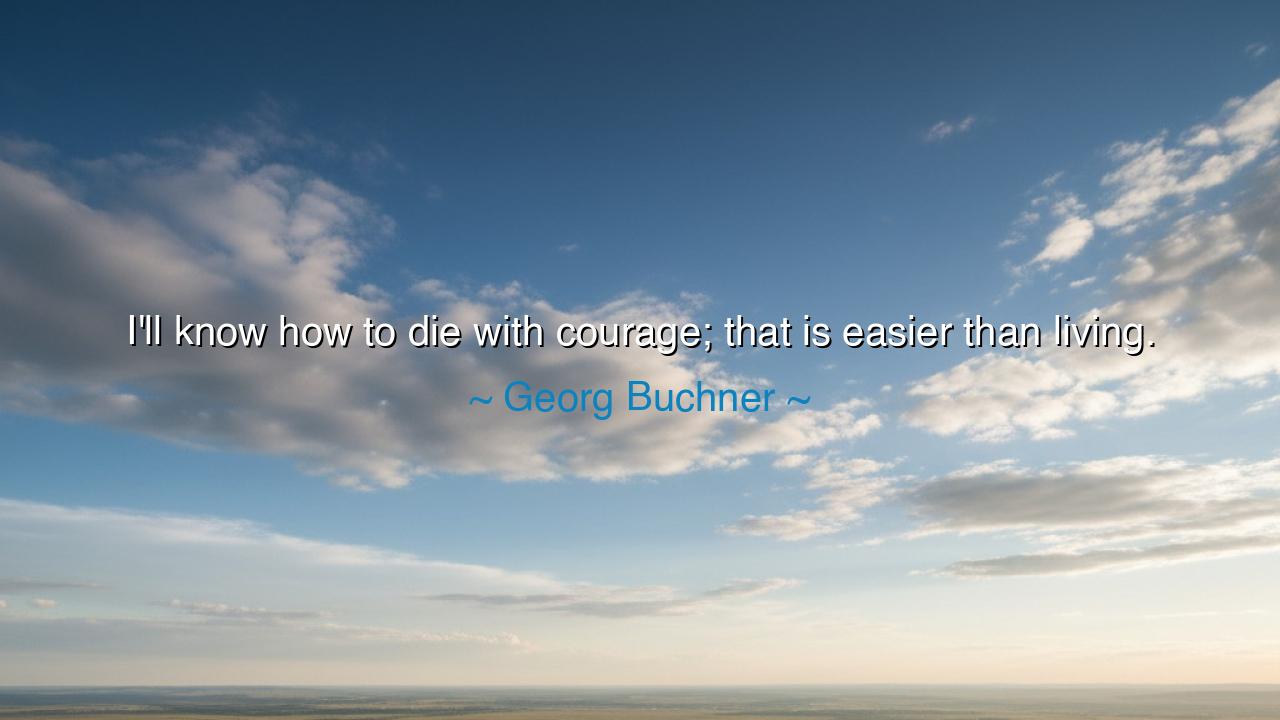
I'll know how to die with courage; that is easier than living.






In the solemn whisper of mortality, Georg Büchner, the young revolutionary and playwright, uttered the piercing words: “I’ll know how to die with courage; that is easier than living.” These words, spoken by one who understood both the flame of conviction and the burden of existence, cut to the heart of the human struggle. They are not the cry of despair, but the revelation of a deeper truth — that to live each day with integrity, patience, and hope requires a courage greater than the defiance of death itself. For death, once faced, is but a moment; life demands endurance through countless moments that test the spirit again and again.
Büchner, who lived in the turbulent 19th century, was no stranger to turmoil. He was a man of intellect and rebellion, whose heart burned with compassion for the oppressed and whose mind was weighed down by the injustices of his age. He died at the age of twenty-three, having already written works that would echo through the centuries, including Woyzeck and Danton’s Death. His words arise not from weakness, but from the profound weariness of one who had seen too clearly the cruelty and futility of human suffering. To die with courage was, to him, a final act of freedom. But to live — to keep struggling amidst disappointment and despair — was the greater, more demanding heroism.
To understand this truth, we must look beyond death and into the long, shadowed corridors of endurance. It is easier, Büchner suggests, to summon courage in a single, final act than to sustain it through the slow trials of daily existence. To face one’s end with dignity requires a moment of fire; to live with courage requires a lifetime of endurance. Every dawn brings its own battles — against fear, against failure, against the endless weight of uncertainty. It is not death that terrifies the wise; it is the ceaseless demand of life, which asks us to rise again after every fall.
History, too, bears witness to this truth. Consider the story of Sophie Scholl, the young German student who, during the Nazi regime, defied tyranny through peaceful resistance. As she stood before her executioners, she showed no fear, saying only, “How can we expect righteousness to prevail when there is hardly anyone willing to give themselves up individually for a righteous cause?” She met death with serenity, her courage unbroken. Yet, before that final act, she had lived with the greater courage Büchner spoke of — the courage to resist every day, to hold fast to conscience in a world gone mad, to live with integrity when others surrendered to evil. Her death was heroic, yes — but her life was greater still, for it was lived in the constant light of truth.
So too in ordinary lives, this wisdom endures. Many dream of grand gestures of bravery — of facing danger or death with valor. But few understand that the noblest bravery is found in the quiet perseverance of those who live well in spite of pain. The mother who rises each day to care for her family in hardship, the worker who labors with honesty though the world offers little reward, the artist who creates beauty in a world that does not see — these are the silent warriors of life. They may not die with fanfare, but they live with courage, and that is the greater triumph.
When Büchner says that dying is easier than living, he does not exalt death but calls us to reverence for life. For life is not a gift to be endured passively, but a calling to be met with strength and grace. To live courageously means to embrace both joy and suffering as teachers, to walk forward even when the path is dark. It means to face the long struggle without surrendering to bitterness or despair. It is not an act of a single moment, but the quiet, continual defiance of the soul that refuses to be broken.
Let this, then, be the teaching passed down: that true courage is not found in dying bravely, but in living faithfully. Do not seek valor in the moment of your end; seek it in every sunrise you meet with an unbroken heart. Live as those who endure not because it is easy, but because it is right — as those who know that to breathe, to hope, and to love amid the trials of the world is the highest act of heroism.
For as Georg Büchner understood, death demands but a moment of resolve, while life demands a lifetime of it. To live courageously — to rise, to strive, to care, to believe — is the hardest and holiest work a human soul can do. And in doing so, one achieves the truest form of immortality: the legacy of a life lived with unyielding courage.






AAdministratorAdministrator
Welcome, honored guests. Please leave a comment, we will respond soon